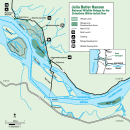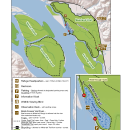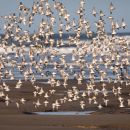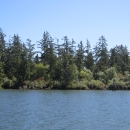Visit Us
National Wildlife Refuges offer us all a chance to unplug from the stresses of daily life and reconnect with our natural surroundings. Change is constant and necessary at Julia Butler Hansen Refuge, providing new experiences with each visit. Daily and seasonal tides, seasons, weather patterns, life cycles and migrating animals all contribute to the consistent flow of opportunities. What will your next visit unveil?
Activities
Click on the Activities below to learn more!
Trails
Download the trail map here
----------------------------------------------------------------------------------------------------------------------------------------------
Mainland Trails
White-tail Trail
Difficulty: Easy
Length (one-way): 0.9 mi
Trailhead Location: Located just prior to the end of Steamboat Slough Rd. The trail starts at the gates leading out onto the setback levee. Enjoy interpretive signs along the trail that highlight various plants and animals found at the refuge. Biking is allowed along the entrance road, Steamboat Slough Rd, and White-tail Trail only.
Center Road Trail (Open June-September; Closed Oct 1 - May 31)
Difficulty: Easy
Length (one-way): 2.5 mi
Trailhead Location: Parking for trail can only be accessed from the western side of Steamboat Slough Road (coming from Skamokawa, WA). The trailhead will be 1.4 miles down on the left hand side and starts at the walk-around gate. Please do not block the gate with your vehicle.
Note: Out and back trail, hikers MUST exit trail from the way they entered, there is no exit at the other end.
Tenasillahe Island Trails
Tenasillahe Trail
Difficulty: Easy
Length (round-trip): 6.5 mi Loop
Trailhead Location: Located on the exterior levee of Tenasillahe Island, the trail is only accessible by boat or kayak.
Note: Tenasillahe Island is only accessible by boat. Remember to bring water, food, and any other necessary items with you when going to the island.
Wildlife Drive (Auto tour route)
The Wildlife Drive auto tour runs along Steamboat Slough Rd, from the refuge office to the parking area beside the Columbia River. It is 2-miles one-way. Pick-up the corresponding brochure and enjoy 8 stops along the drive. Please be mindful of pedestrians and bicycles.
Related Documents
Here you will find a variety of Refuge maps and resources.
Other Facilities in the Complex
Julia Butler Hansen Refuge for the Columbian White-tailed Deer is managed as part of the Willapa National Wildlife Refuge Complex.
A National Wildlife Refuge Complex is an administrative grouping of two or more refuges, wildlife management areas or other refuge conservation areas that are primarily managed from a central office location. Refuges are grouped into a complex structure structure
Something temporarily or permanently constructed, built, or placed; and constructed of natural or manufactured parts including, but not limited to, a building, shed, cabin, porch, bridge, walkway, stair steps, sign, landing, platform, dock, rack, fence, telecommunication device, antennae, fish cleaning table, satellite dish/mount, or well head.
Learn more about structure because they occur in a similar ecological region, such as a watershed or specific habitat type, and have a related purpose and management needs. Typically, a project leader oversees the general management of all refuges within the complex and refuge managers are responsible for operations at specific refuges. Supporting staff, composed of administrative, law enforcement, biology, visitor services, and maintenance professionals, are generally, but not always, centrally located and support all refuges within the complex.
The Willapa National Wildlife Refuge Complex consist of three refuges; Willapa National Wildlife Refuge, Julia Butler Hansen Refuge for the Columbian White-tailed Deer and Lewis and Clark National Wildlife Refuge.
The Complex Headquarters Office is located at 7112 67th Place, Long Beach, WA 98631.
Rules and Policies
National Wildlife Refuges are places where wildlife comes first, and although people are welcome, activities are regulated and monitored to ensure that impacts are minimal to the plants and animals that call the refuge home, and so future generations can continue to enjoy for years to come.
Refuge Hours
Visitors are welcome to enjoy refuge trails every day from sunrise to sunset. The office building is open from 7:30 am - 4:00 pm Monday through Friday, and is closed on all Federal holidays.
Hiking
Hiking is permitted on refuge trails. Some trails are seasonal only. Please stay on trail to avoid habitat and wildlife disturbance.
Dogs
Dogs are not allowed on the refuge except for dogs engaged in authorized hunting activities.
Bicycles
Bicycles are allowed on the main road (note: there is no bike lane), and White-tail Trail.
Take Only Memories (and photos!)
Please do not collect or move archeological or historic objects, or any natural material such as plants, mushrooms, berries, and antler sheds. If you pick something up to take a closer look, put it back where you found it.
Camping
Camping is not allowed on the refuge.
Fires
Fires are prohibited.
Hunting
Hunting of waterfowl, coot, and snipe is permitted on designated areas of the refuge. All state regulations apply to hunting on the refuge. Julia Butler Hansen Refuge for the Columbian White-tailed Deer has lands in both Washington and Oregon, please know where you are and follow state regulations.
Fishing
Bank fishing is permitted from the Mainland Unit shorelines adjoining Elochoman and Columbia Rivers as well as Steamboat and Brooks Sloughs, and the shorelines of Refuge islands located in Oregon, in accordance with State fishing regulations. Bank Fishing is permitted in the pond adjacent to the Diking District pumping station by Brooks Slough. Areas of the mainland Unit not listed above are closed to fishing. All state regulations apply.
Trapping
Trapping is allowed on Willapa NWR. Trapping is a wildlife management tool used on some national wildlife refuges. Trapping may be used to protect endangered and threatened species or migratory birds or to control certain wildlife populations. The U.S. Fish and Wildlife Service also views trapping as a legitimate recreational and economic activity when there are harvestable surpluses of fur-bearing mammals. On this refuge trapping occurs only as a wildlife management tool and is prohibited to be conducted by the public. Signs are posted on refuges where trapping occurs. Contact the refuge manager for specific regulations.
Closures
Areas within refuge boundaries may be closed to public entry due to sensitive species or restoration activities. Be aware of signs indicating closed areas. The Center Road Trail is closed to all public entry from October through May, including foot travel, to minimize impact on wildlife. Please pay special attention at gates and other points of entry to determine if the area is open.
ATVs and Horses are prohibited on Willapa National Wildlife Refuge.
Drones
The launching and landing of uncrewed aircraft systems/drones are prohibited on all national wildlife refuges.
Locations
Julia Butler Hansen Refuge for the Columbian White-tailed Deer is located in southwest Washington state, along and in the Columbian River. There are multiple units, including a few islands in both Washington and Oregon.
The main unit of the refuge is located along Highway 4 in Cathlamet, WA. Coming from the East, it is approximately 2-miles past Cathlamet. Coming from the West, it is approximately 4-miles past Skamokawa. Turn onto Steamboat Rd to enter the refuge.
Visit our "Trails" page for more information on hiking-specific access.







